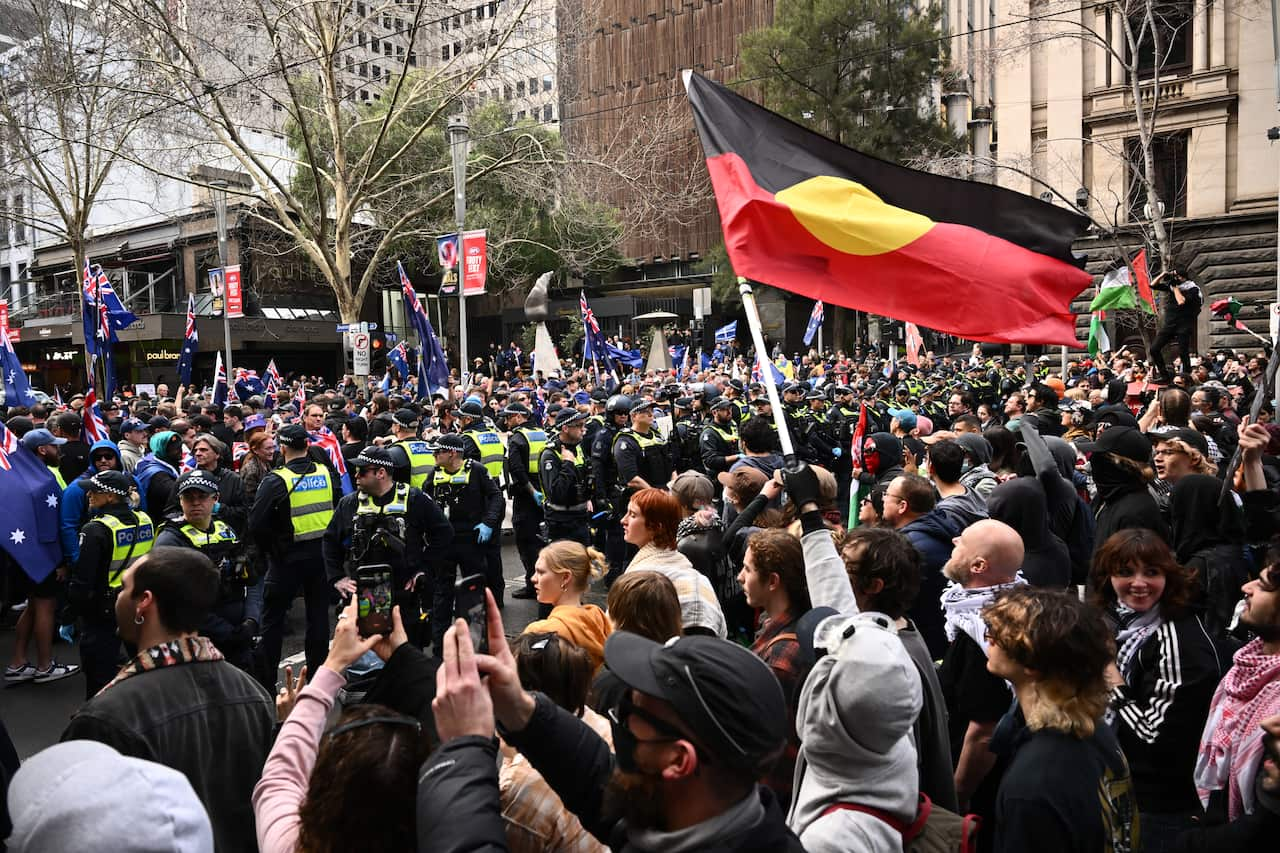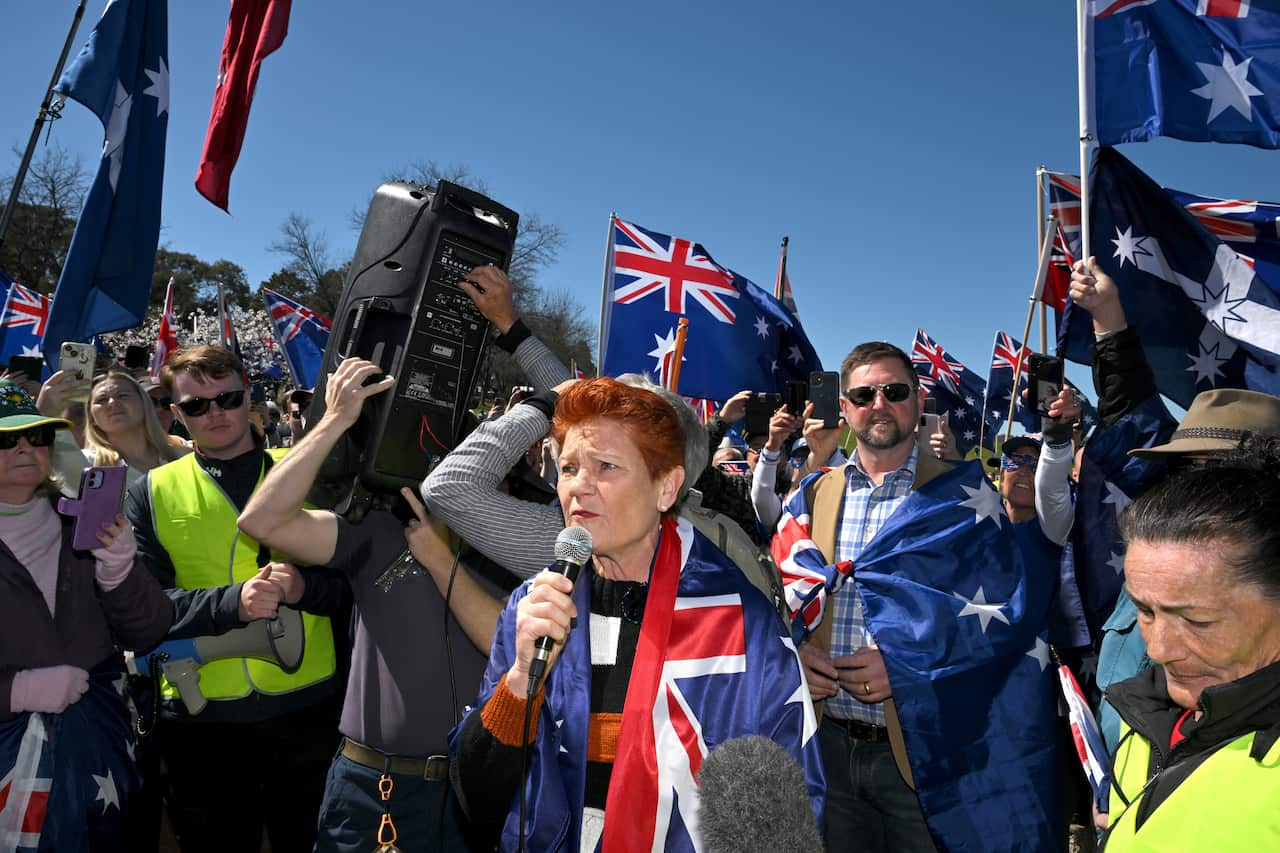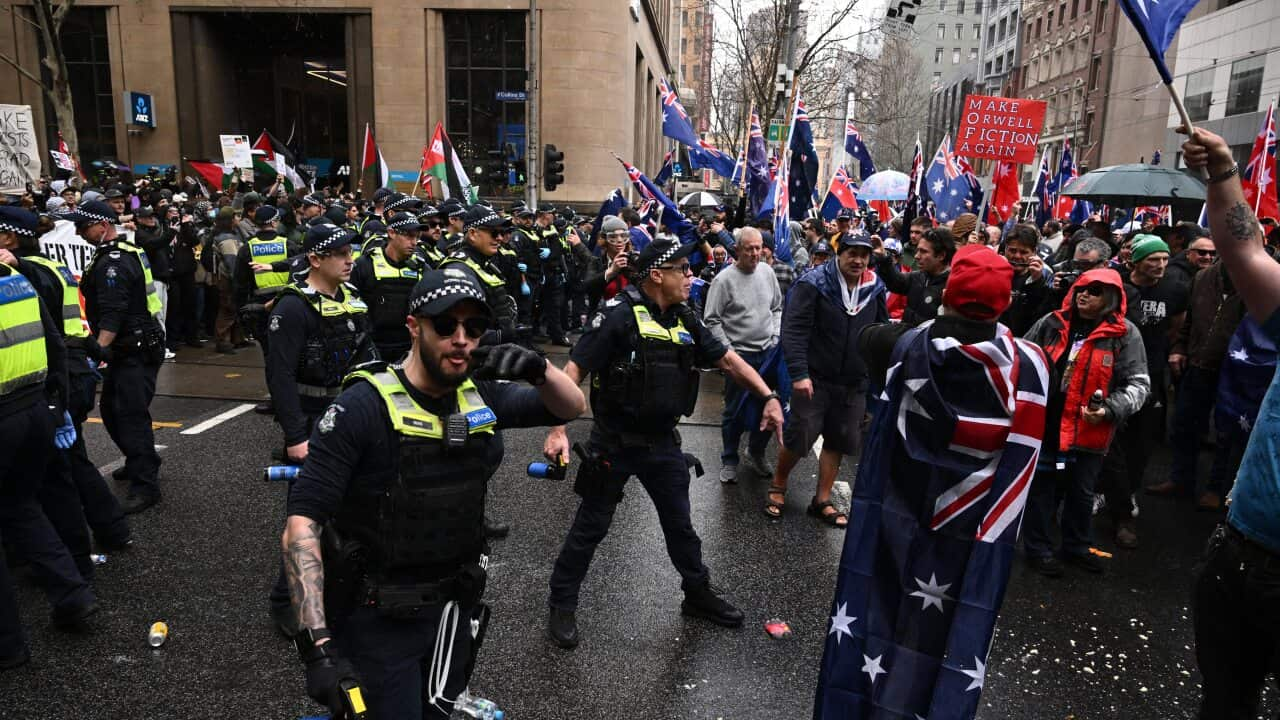Thousands of people have attended anti-immigration rallies and counter-protests in cities across the country.
The organisers of the "March for Australia" rallies called for an end to what they described as a government policy of "mass migration".
The government condemned the actions ahead of the day, and some Indian community leaders had expressed concerns that migrants could be targeted by the demonstrations.
Australian flags and nationalist chants
March for Australia rallies were held in all capital cities and some smaller cities, with speakers and protesters demanding a reduction in migration numbers.
Many who attended the March for Australia rallies either flew or wore Australian flags, shouting anti-migration and nationalistic slogans such as "love it or leave it".
In Sydney, one banner carried by members of the march said it was "time to put Australia first".
Some of those in attendance insisted they were not against migration in general, but that they believed migration levels were too high.
In the lead-up to the day, social media posts were shared claiming that 1,500 migrants were arriving in Australia each day.
The Australian Bureau of Statistics questioned those numbers, saying they were not an accurate reflection of migration figures.
Counter-protests and clashes
Counter-protesters gathered in several cities to oppose the March for Australia rallies.
In Melbourne, violent clashes between March for Australia demonstrators and counter-protesters erupted multiple times. Police said an estimated 5,000 people participated across the disparate rallies.
Police used pepper spray and baton rounds when separating protesters from each other, and the riot squad was deployed.

"The priority for police was to separate opposing groups and prevent breaches of the peace," Victoria Police said in a statement.
Anti-immigration protesters and counter-protesters also came face-to-face in Brisbane, with police creating a line to separate the two groups.
A small counter-rally was also present in Canberra, with officers similarly keeping the two groups apart. Police had to break up a scuffle after an anti-fascism protester was put in a headlock by a man draped in an Australian flag.
Pauline Hanson and Bob Katter address crowds
One Nation leader Pauline Hanson was among the politicians who spoke at the rallies.
"If you don't love it, I'll be the first one to take you to the airport and put you on a plane," she told the crowd in Canberra. Hanson has long expressed nationalist and anti-immigration views, using her maiden speech in parliament in 1996 to call for a drastic reduction in immigration.
One Nation senator Malcolm Roberts also addressed those who gathered in the country's capital.

Bob Katter, meanwhile, spoke at the Townsville event.
The Katter's Australia Party leader had signalled his presence earlier this week, during a press conference in which he threatened to punch a journalist who asked Katter about his Lebanese heritage. Two other Katter's Australia Party MPs also joined the march.
White nationalist Thomas Sewell, the leader of the neo-Nazi group the Nationalist Socialist Network, also spoke at one of the rallies, in Melbourne.
The official March for Australia Instagram account had distanced itself from figures like Sewell after he called the protest "our" rally on the messaging app Telegram.
Multiple arrests
Several arrests were made throughout the day, with six people arrested in Melbourne.
Victoria Police said in a statement that those arrested face charges including assaulting police, behaving in a riotous manner, attempted robbery, assault and resisting police.
In Sydney, NSW Police detained a woman who allegedly hurled abuse at the pro-Palestinian crowd.
NSW Police said one arrest had been made for breaching the peace, but no charges had been laid. Police said their operation had ended with no major incidents.
South Australia Police said they made three arrests in Adelaide during the rallies. But they said that the demonstrations were held "safely and without major disruption".
Victoria Police also made at least three arrests during the rallies in Melbourne.
Anti-immigration protests criticised by politicians
In the lead-up to the rallies, the Australian government voiced its opposition to them, saying "there is no place for any type of hate in Australia".
Home Affairs Minister Tony Burke said the government stood against the rallies. "Nothing could be less Australian," he said.
Multicultural Affairs Minister Anne Aly said the government stood with all Australians against "those who seek to divide us and who seek to intimidate migrant communities".
Opposition leader Sussan Ley called for calm and respectful behaviour ahead of the protests, saying there was "no place for violence, racism or intimidation".
The Greens also condemned the rallies, saying they stood in solidarity with communities targeted by them.
Greens anti-racism spokesperson Mehreen Faruqi said the far right had become emboldened by sections of the media and political class.
"These rallies must be called out for what they are, acts of racist fearmongering and hate," she said.
Earlier this month, experts told SBS News that misinformation blaming migrants for deeper societal problems has been central to a rise in anti-immigration sentiment in Australia.
Liz Allen, a demographer at the Australian National University Centre for Social Policy Research, described myths that migrants suppressed wages, stole local jobs or inflated house prices as "nonsense".
"Increasingly, we're seeing Australians fear that they're being left behind and that fear — whether real or simply perceived — is something that we cannot ignore," Allen said.
"That loss of hope means fear can take over, and that's a very powerful emotion at the heart of anti-immigration sentiment," she said.
— With additional reporting by the Australian Associated Press.

